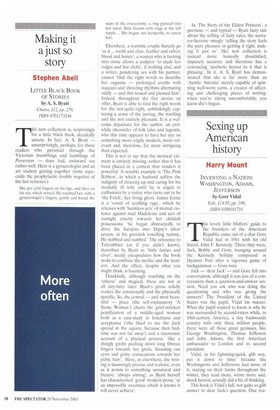Making it a just so story
Stephen Abell
LITTLE BLACK BOOK OF STORIES by A. S. Byatt Chatto, £12, pp. 279, ISBN 0701173246 This new collection is, surprisingly for a little black book, decidedly unsexy. In fact, A. S. Byatt — unsurprisingly, perhaps, for those readers who persisted through the Victorian mumblings and fumblings of Possession — does bad, awkward sex rather well. Here is a gynaecologist and an art student getting together (note especially the prophylactic double negative of the last sentence):
She put cold fingers on his lips, and then on his sex, which stirred. He touched her, with a gynaecologist's fingers, gently and found the scars of the ovarectomy, a ring pierced into her navel, little breasts with rings in the left nipple ... She began, not inexpertly, to caress him.
Elsewhere, a wartime couple fiercely go at it ... tooth and claw, feather and velvet, blood and honey'; a woman who is turning into stone allows a sculptor 'to study her ridges and her clefts', if nothing else; and a writer, pondering sex with his partner, cannot 'find the right words to describe her orgasms — prolonged events with staccato and shivering rhythms alternating oddly — and this teased and pleased him'. Indeed, throughout the five stories on offer, Hyatt is able to find the right words for the not-quite-right, unblinkingly capturing a sense of the jarring, the startling and the not entirely pleasant. It is a welcome departure for the author, an erstwhile chronicler of folk tales and legends, who this time appears to have her eye on something more edgily modern, more relevant and, therefore, far more intriguing than expected.
This is not to say that the mystical element is entirely missing, rather that it has been placed in a context that renders it powerful. A notable example is 'The Pink Ribbon', in which a husband suffers the indignity of cleaning up and caring for his mentally ill wife until he is urged to euthanasia by a visitor who turns out to be 'the Fetch', her living ghost. James Ennis is a 'vessel of seething rage', which he releases with 'harmless acts' of mental violence against mad Madeleine and acts of outright cruelty towards her childish possessions: 'he began abstractedly to drive the hairpins into Dipsy's silver screen, in his greenish towelling tummy. He stabbed and stabbed.' The reference to Teletubbies (as if you didn't know), described by Byatt as 'little fairies and elves', neatly encapsulates how the book seeks to combine the mythic and the modern. And the effect, despite what you might think, is haunting.
Thankfully, although touching on the 'etheric' and magical, these are not at all airy-fairy tales: Byatt's prose solidly evokes the emotionally and the physically specific. So, the central — and most beautiful — piece (the self-explanatory 'A Stone Woman') charts the grief-stricken petrification of a middle-aged woman both as a case-study in loneliness and acceptance ('she liked to see the dark spread in the square, because then bedtime was not far away') and a taxonomic account of a physical process: 'like a shingly girdle pushing down long fibrous fingers towards her groin, thrusting out cysts and gritty coruscations towards her pubic hair'. Here, as elsewhere, the writing is dauntingly precise and realistic, even as it points to something unnatural and bizarre: 'always aiming', as Byatt herself has characterised 'good' modern prose, 'at an impossible exactness which it knows it will never achieve', In 'The Story of the Eldest Princess', a previous — and typical — Byatt fairy tale about the telling of fairy tales, the narrator-heroine smugly 'telling the story feels the pure pleasure in getting it right, making it just so'. Her new collection is instead more honestly dissatisfied, impurely accurate and therefore has a convincing 'aesthetic horror to it that is pleasing'. In it, A. S. Byatt has demonstrated that she is far more than an 'Auntie Antonia' merely capable of spinning well-worn yarns, a creator of affecting and challenging pieces of writing: when you're sitting uncomfortably, you know she's begun.


























































































 Previous page
Previous page